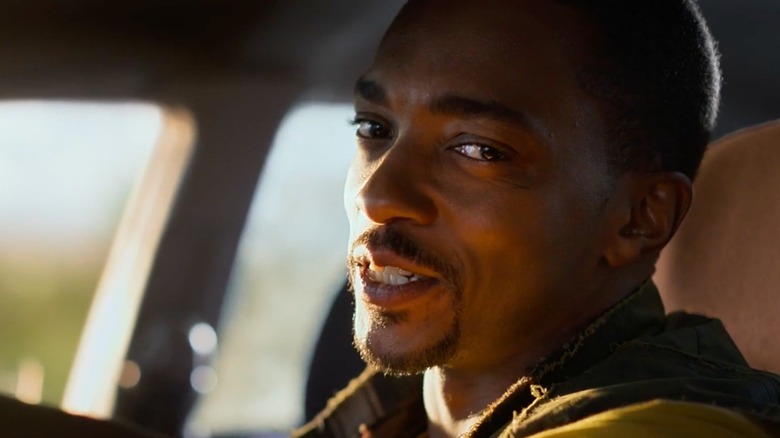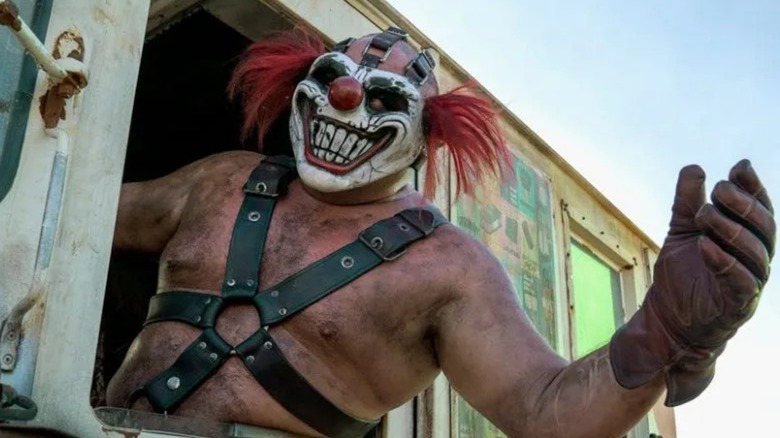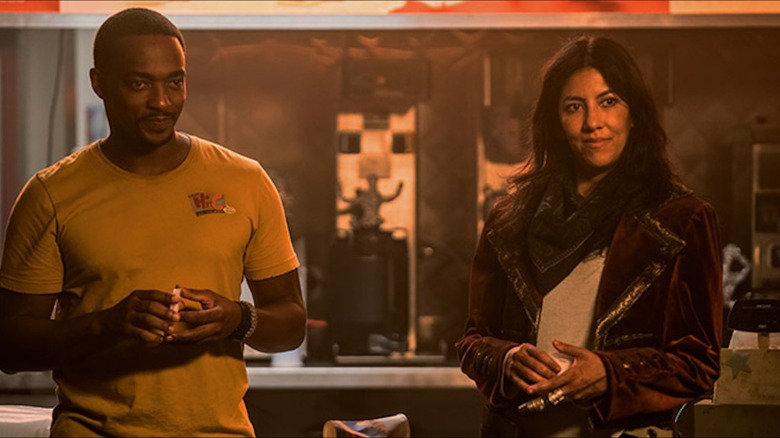Twisted Metal Review: The Surprising Video Game Adaptation Needs More Thrills
For the longest time, adapting video games into movies or television was an all but guaranteed disaster; films like "Postal," "Rampage," "Doom," and "Max Payne" were all met with widespread derision. But 2023 has provided a major turning point: Thanks to the enormous box-office success of "The Super Mario Bros. Movie" and the massive acclaim for the HBO series "The Last of Us," video games are finally being looked at as a source for great stories.
That brings us to Peacock's "Twisted Metal." I've been playing video games my whole life, and if you were to ask me what games would make a great television series, "Twisted Metal" would be at the bottom of my list — if it even appeared at all. That's not because they're bad games mind you, but they are significantly lacking any significant story. There's a pretense of one, but it's a franchise all about driving a car and obliterating other cars. That makes for one hell of a game, but a 10-episode series?
"Twisted Metal" the show has some familiar elements of the games but largely forges its own path. In the early 2000s, an event occurred that wiped out all forms of technology. Television, the internet, cell phones — all gone in a heartbeat. Naturally, this led to widespread societal breakdown. Cities across America walled themselves off and tossed out the riff-raff, exiling criminals and the generally unsavory into what's become known as the in-between. Outside of the cities, America has become apocalyptic, with countless opportunities for murder on each road.
The man who tells us all of this is John Doe (Anthony Mackie) who traverses the in-between, working as a "milkman" — a delivery driver. He's one of the most reliable milkmen there are; he's done it his whole life and hasn't been killed yet, which is no small feat. His prowess has attracted the attention of Raven (Neve Campbell), the COO of New San Francisco. She offers him a job, but to do it, he'll have to travel all across America and back to make the delivery. But if he pulls it off, Raven's willing to offer him what he's always wanted: a life inside city walls, and away from the dangers he's been narrowly escaping as long as he can remember.
The world needs more Sweet Tooth
John accepts (of course he does, if he didn't there'd be no show), and makes an unlikely partnership with Quiet (Stephanie Beatriz). The duo traverses the treacherous roads ruled by Officer Stone (Thomas Haden Church), an uber-muscly law enforcement officer with a twisted sense of justice. There's also Sweet Tooth (the body of Samoa Joe, the voice of Will Arnett) the gleefully and terrifyingly unhinged clown-masked man with a penchant for theatre and murder.
Oh, Sweet Tooth. The clown has been an emblem for just about every "Twisted Metal" video game, and he's brought to life brilliantly here. He's the show's crowning achievement, amping up the excitement factor whenever he's on screen. Sweet Tooth is completely and totally unpredictable and is both extremely funny and legitimately menacing. The whole cast is impressive, but Arnett does fantastic work using just his voice (and Samoa Joe's body) to bring the character to vivid life. If you were worried the show wouldn't do Sweet Tooth justice, have no fear, because it totally delivers an unforgettable character.
If there was ever a show that should be outrageously silly and off-the-wall at every imaginable opportunity, it's "Twisted Metal." Need I remind you that this is based on a video game where all you do is destroy vehicles in increasingly ridiculous fashions? When "Twisted Metal" leans into the lunacy of it all, it's glorious. The opening scene is gratuitously violent, gleefully embracing the silliness of the games. And every moment with Sweet Tooth provides the perfect blend of gross-out violence and belly laughs "Twisted Metal" seeks to achieve.
But every time it feels like "Twisted Metal" will finally dive in head first and completely embrace its roots, it falls into the pitfalls of trying to give every character an extensive backstory and emotional resonance. Most of the 10 episodes in the first season of "Twisted Metal" have two storylines: the apocalyptic present focusing on John's delivery, and the past of one of the series characters. This isn't inherently a bad structure; the backstory can provide context we might not get otherwise. It is, however, a rather lazy choice. The characters in "Twisted Metal" are interesting and well-written enough that there's no need to dive into their backstories to figure out who they are — we get enough of that in the present-day storyline.
Needs more fire in the fuel
Worse still, for characters who are as amusingly anarchic as Sweet Tooth, his actual past could never match whatever the viewer has concocted in their heads. There's a desire for shows to interrogate why characters are evil, but sometimes the most engaging thing is to offer no context for their past at all. Just being a murdering, hulking figure is more than enough to be exciting.
These backstories can offer context into how the universe of "Twisted Metal" became so ... well, twisted, but they leave compelling issues unexplored. This is especially clear when we learn about Quiet's past. I won't spoil anything, but there's a particularly shocking way of life that we only get a taste of. It's the kind of thing that, examined further, would do wonders to flesh out the show's universe, but it's simply never referenced again, which feels like a major missed opportunity.
None of this is to say that the show shouldn't invest in its characters — just that everything we need to know about this rowdy bunch of killers is explored thoroughly enough in a single timeline. These backstories are largely what you expect them to be, and feel designed to tug at your emotions. That works for a video game adaptation like "The Last of Us," which came with a deeply tragic and engaging story already. But for something like "Twisted Metal," whose story doesn't go much further than "smash cars and kill"? The show would have benefitted from a whole lot more peddling-to-the-metal and fewer attempts at forced emotional resonance. It feels like there's an innate desire for "Twisted Metal" to feel like prestige TV when it needs to dial into the silliness.
That said, when "Twisted Metal" really embraces the vehicular destruction of it all, it's one of the most delightful television experiences around. The environments are pretty sparse in a way that smartly reflects the apocalyptic setting. Action is well-choreographed, the kills are gnarly, and watching various cars fly around and flip over in dramatic fashion never stops thrilling. In these moments, the show delivers on the high-octane thrills a name like "Twisted Metal" promises — and the finale offers all the chaotic, explosive violence that feels like a video game come to life. It's a shame, then, that the show all-too-regularly bogs itself down in overly familiar plotlines, instead of letting the craziness take over. At least there's Sweet Tooth.
/Film Rating: 6.5 out of 10


